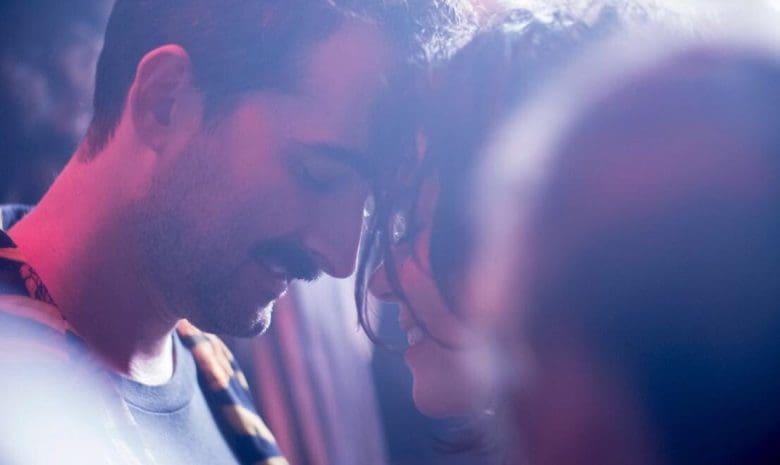
Three years ago, Mark Duplass wrote one of the most intimate films of recent memory with Blue Jay, a painfully touching portrait of high school sweethearts meeting again years later. It was as if the Before trilogy had a black-and-white hipster child. Now, his brother, Jay Duplass, co-stars in what could be a perfect companion piece, Pink Wall, a Welsh production with six scenes across six years of a troubled relationship.
I fully admit I’m prone to cry when I become so invested in characters. I did with Blue Jay. Interestingly, those same heartstrings weren’t pulled during Pink Wall despite the overwhelming emotion on display between Duplass and co-star, Tatiana Maslany. That’s a rare thing of beauty and completely my own subjective experience, but freshman writer-director Tom Cullen of acting fame (Weekend, Black Mirror) cracked an almost impossible code in writing a non-linear love story.
Starting in Year Four of six, Cullen introduces us to the tipping point of Leon (Duplass) and Jenna’s (Maslany) relationship. Other voices at the restaurant enter the conversation, but the camera locks on the couple without a single cut as conversation rolls from funny improv to an awkward exchange when Jenna yells at her brother for joking Leon is a submissive partner. From the first minutes of the scene, we’re presented with infinite intrigue watching two talking heads.
Duplass and Maslany’s chemistry fuels the scene, but so does the natural shift in tension that follows them outside, not only proving Cullen knows how to set a camera in one place but sweep around dialogue to shift power dynamics and visually parallel his stars’ chemistry. In an ambitious move, the next scene in Year One shifts its aspect ratio from 16:9 to 4:3. Each year is represented in a new aspect ratio- the further along, the wider the screen.
It’s a daring choice that tells everything about the characters without needing a single word. The wider the screen ratio, the further emotionally apart Jenna and Leon become. They eventually move out of the intimate, honeymoon phase that the first two years are presented in, forcing the actors into a more visceral distance from each other. It’s a rush of energy, caught in love. Cullen’s at his most visually adventurous at the bookends of the relationship, using a quick-cutting neon party sequence to introduce Jenna and Leon together without a single word spoken and in the end, sit on a shot set against a drab English morning. Maslany and Duplass’s talents are on full display, but so is Cullen’s ability to tie their stories together.
There’s an improvisational quality to the whole story, but during a Q&A after the screening at SXSW, Cullen and his stars relayed that most of the production stayed close to the script, as it was shot in just 11 days on a budget under $125 thousand. Any improvisation came from the line reading and blocking, yet another area that stands out. Shooting a film for the first time alongside cinematographer Bobby Shore (The Invitation).
More than the screen presentation, Cullen proves himself as a visual artist. He often sets up shots to look good, as if no one was in frame, but then sets an actor in place anyway. It may be a shot of Leon faux-drumming with baguettes, putting the city in focus to force into his perspective while Leon is blurred, or a dinner scene that cuts off at the shoulders following a heated exchange between Jenna and Leon regarding their sex life. All this makes Pink Wall as bold of a story through its aesthetics as its script and puts all the emotion into a physical representation.
Had the story been told through a traditional narrative, a lot of the emotional charge would be lost since the staggered timeline boasts a deep contrast that puts Leon and Jenna in perspective. One scene, in which Leon shows his passion to be a photographer and pushes Jenna into working as a full-time producer later, shows how one side of the relationship stalled out over a couple of years. Instead of a taking an hour, it’s a quick emotional release. There is one scene —Year Two — that feels forced but out of just six scenes, makes for wild success. Even that scene kicks into gear toward the end, pushing Leon and Jenna even closer and building on their introduction and end.
Perhaps the greatest success of Pink Wall is that it never takes itself too seriously. It’s as funny as it is emotional and smart. In his first time in the director’s chair, Cullen has shaped a perfect portrait of a relationship that rivals Bergman’s Scenes from a Marriage, but in a third of the time.


Comments are closed.